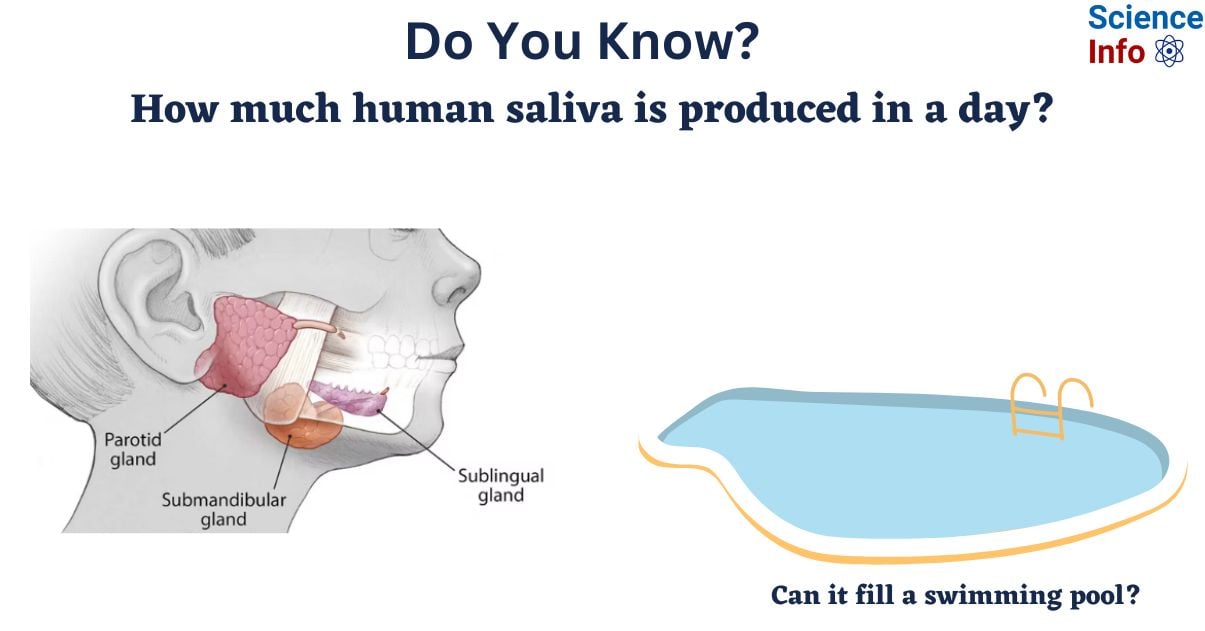Consider the delightful sensation of imagining a delicious food tantalizing your taste buds, causing your mouth to water. It’s a curious thought—how much saliva do we generate each day? Is it solely triggered by thoughts of food, or does saliva serve other purposes too? Have you ever considered how much human saliva is produced in a day, week, or even year? And if we’re really going big, how about your entire life? The answer may surprise you!

Interesting Science Videos
How much human saliva is produced in a day?
The average human produces roughly 0.5 to 1.05 milliliters of saliva every minute. Because it may vary from person to person, let us assume a low average of 0.5 milliliters each minute. That doesn’t sound like much, but multiplying 0.5 milliliters per minute by 24 hours in a day equals to 720 milliliters.
In a nutshell, it can be said that on a typical day, the average person generates 0.5 to 1.5 liters of saliva.
How much human saliva is produced in a year?
Taking the average human produces up to 720 milliliters of saliva per day, multiply that by 360 days in a year to get 262.8 liters per year. Thus, we can say we produce a lot of saliva per year.
And if we keep going calculating the numbers, the normal human life duration is 80 years, thus we can predict that you will produce around 21,024 liters of spit over your lifetime. That’s like filling a little swimming pool with saliva.
You might be wondering how many salivary glands we actually have after hearing that you can fill a swimming pool with saliva in your lifetime. Our glands are positioned on the inside of each cheek, at the bottom of your mouth, and beneath your jaw at the front of your mouth. Each of these glands produces approximately 2-4 quarts of saliva every day.
Let us learn a little on salivary glands
What are the salivary glands?
Your salivary glands generate saliva (spit) and release it into your mouth via ducts, or small apertures. They lubricate your mouth and throat, help you swallow and digest, and protect your teeth from bacteria that cause cavities.
What are the three main salivary glands?
Your salivary glands are divided into three primary pairs, which include:
Sublingual glands: These glands are located beneath the floor of your mouth, on either side of your tongue.
Submandibular glands: The submandibular salivary glands, located beneath your jaw, are divided into two parts: the superficial lobe and the deep lobe. Saliva produced by your submandibular glands enters your mouth from behind your tongue, much like your sublingual glands do.
Parotid glands: The parotid glands are located right in front of your ears. Your parotid glands, like the submandibular glands, are divided into two parts: superficial and deep. Saliva produced by your parotid glands enters your mouth through tiny ducts near your upper teeth.
What is the function of salivary glands?
The salivary gland’s primary function is saliva production. Saliva is essential for maintaining good oral and general health. For example, saliva.
- Keeps the mouth and throat lubricated and comfortable.
- Moistens food, making it easier to swallow.
- It contains amylase, an enzyme that helps your stomach break down starches in food.
- Keeps your mouth clean.
- Reduces the risk of cavities and gum disease.
- Helps to maintain the pH balance in your mouth.
What happens if too little saliva is produced?
Certain conditions and medications might influence how much saliva you produce. If you don’t produce enough saliva, your mouth can get quite dry. This symptom is known as dry mouth (xerostomia).
Dry mouth makes the gums, tongue, and other oral tissues swell and feel painful. Germs thrive in this type of environment. A germy, dry mouth causes poor breath.
Dry mouth also increases your risk of developing tooth decay and gum disease. That’s because saliva helps to remove food particles from your teeth. This reduces your risk of developing cavities.
If you have dry mouth, you may find that you are not tasting things as well as you once did.
Too little saliva and dry mouth may be caused by:
- Several disorders, including HIV/AIDS, Sjogren’s syndrome, diabetes, and Parkinson’s
- Blockage in one or more tubes draining saliva (salivary duct obstruction)
- chemotherapy and radiation therapy
- Dehydration
- The “fight or flight” stress reaction
- A structural issue with the salivary duct.
- Smoking cigarettes
Hundreds of regularly used drugs have been linked to dry mouth, including:
- Antihistamines
- Anxiety medications
- Appetite suppressants.
- Certain forms of blood pressure medications
- Diuretics (water pills).
- Most antidepressants
- Certain painkillers (analgesics)
What happens if too much saliva is produced?
Hypersalivation and sialorrhea are common names for excessive saliva. Excess saliva is usually not a cause for concern unless it persists. It is natural to produce more or less saliva based on what you eat or drink. Your body normally gets rid of excess saliva by swallowing more.
You can produce excessive saliva if:
- One or more salivary glands are hyperactive.
- You have trouble swallowing.
The following diseases and health situations might generate excessive saliva:
- Amyotrophic lateral sclerosis (ALS), also known as Lou Gehrig’s disease
- Bell’s palsy.
- Cerebral Palsy
- Gastroesophageal reflux disorder (GERD)
- Enlarged tongue (macroglossia).
- Intellectual impairment.
- Parkinson’s disease.
- Poisoning
- Pregnancy (often noticed in those with severe nausea and vomiting).
- Rabies
- Stroke
Medications that can produce excessive saliva include:
- Klonopin (clonazepam) is a seizure medication.
- Clozapine (Clozaril, Fazaclo ODT) is a schizophrenia medication
- Salagen (pilocarpine) is used to relieve dry mouth after radiation therapy.
Video on How much human saliva is produced in a day?
References
- https://dentalimpressionsofankeny.com/2018/02/saliva-time-too-little-or-too-much/
- https://my.clevelandclinic.org/health/body/23462-salivary-glands
- https://teachmephysiology.com/gastrointestinal-system/mouth/saliva-secretion/
- https://www.sciencefocus.com/the-human-body/how-much-saliva-do-we-produce-in-a-lifetime
- https://lindaledentists.com/how-much-saliva-do-you-make-each-day/
- https://www.iflscience.com/how-much-saliva-will-you-produce-in-your-life-67841
- https://www.webmd.com/oral-health/what-is-saliva

